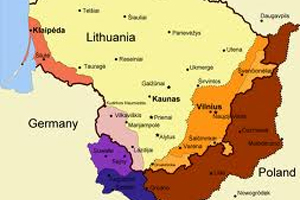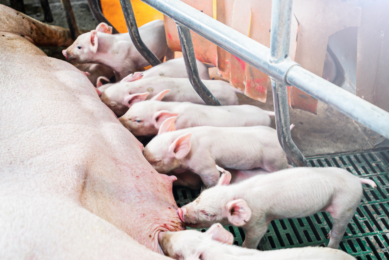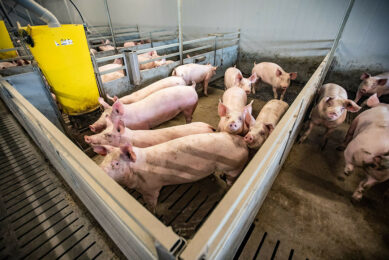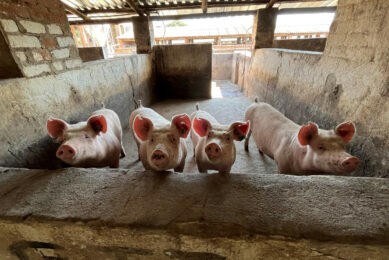Lithuania: Biogas plants open, pig farm odours reduced

Idavang and Modus energija opened the first two combined heat and power generation plants in Lithuania, which will neutralise odours from pig farms.
One of the power plants has been constructed near Idavang pig farm Sajas in Kelmė district. The second power plant is near Lithuania’s biggest pig farm Pasodėlė owned by Idavang in Panevėžys district.
Both power plants produce biogas by processing liquid manure accumulating in pig farms. When processed, it becomes almost an odourless high quality organic fertiliser.
The pig farm Pasodėlė located not far from the Krekenava town breeds about 50 thousand pigs, whose waste mixed with green mass – sugar-beets and maize silos – is used in the biogas power plant. Micro-organisms dissolve organic substances in the bioreactor of the plant, where biogas burnt in an internal combustion engine is produced. The generated energy is transformed into heat, which is used for heating the plant and the pig farm, as well as into power, which is transmitted into the overall electricity energy network of the country.
Almost odourless high quality processed fertilisers are stored in Pasodėlė until the fertilisation season. Up to 105 thousand tons of fertilizers are to be produced in one year. According to Saulius Leonavičius, the general manager of Idavang, such organic fertilisers are considerably more effective for improving soil fertility than pig manure.
“Fertilisation seasons were the most unpleasant periods for people living in the surroundings. Since farmers do not always have possibilities to timely plough in the fertilised fields, the latter emit odour. To change the situation we built a biogas power plant whose processed fertilisers will not cause discomfort to neighbours”, S. Leonavičius says.
The electric power of the biogas power plant jointly owned by Modus Engerija and Idavang company UAB Psenergija reaches 999 kW and the heating power is 1058 kW. To generate this power the plant will use 12 thousand tons of sugar-beets and 3 thousand tons of maize silos per year.
The power plant in Kelmė district operates according to the same principle. The electric power of this combined heat and power plant owned by UAB Senergita reaches 637 kW, and the heating power is 680 kW. To generate this power the plant will use 50 thousand tons of liquid manure and 10 thousand tons of sugar-beets per year.
According to Ruslanas Sklepovičius, the director of Modus energija belonging to Modus group, the benefits of biogas power plants will soon be felt by electric power consumers. He says that the clean power generated in these power plants will be cheaper than power generated using fossil fuel.
“These two power plants will create 16 working places in rural areas. Besides, it is estimated that a biogas power plant of one megawatt capacity creates about 10 direct and indirect working places, thus a number of people will be employed in related areas. Besides, these plants will reduce the natural gas import by 3.2 million cubes and will contribute to increasing Lithuania’s energetic independence”, R.Sklepovičius says.
According to R. Sklepovičius, these two power plants generating 13.1 mln. kWh of electricity per year could supply electricity to more than 7.5 thousand individual households equaling the number of households of several small towns like Krekenava near Pasodėlė.
The biogas power plant project was implemented by the engineering company Renvia as per Modus energija commission.
The investment in the two biogas power plants totalled almost 26 million litas.
Biogas production from liquid pig manure is one of the best climate change prevention technologies. The new plant Pasodėlė will alone protect the atmosphere from almost 30 thousand tons of greenhouse CO2 gas per year
Modus energija and Idavang are planning to construct several biogas power plants more to process organic waste of animal origin.
The biogas power plant project is funded by Modus energy and Idavang as well as a long-term loan of 14.8 million litas given by Swedbank. The Business Angels Fund I also invested in the development of this project. The Business Angels Fund I founded by the European Investment Fund and the Ministry of Economy is focussed on investment in rapidly growing innovative companies. The planned invesment in the whole project will total 100 million litas.











